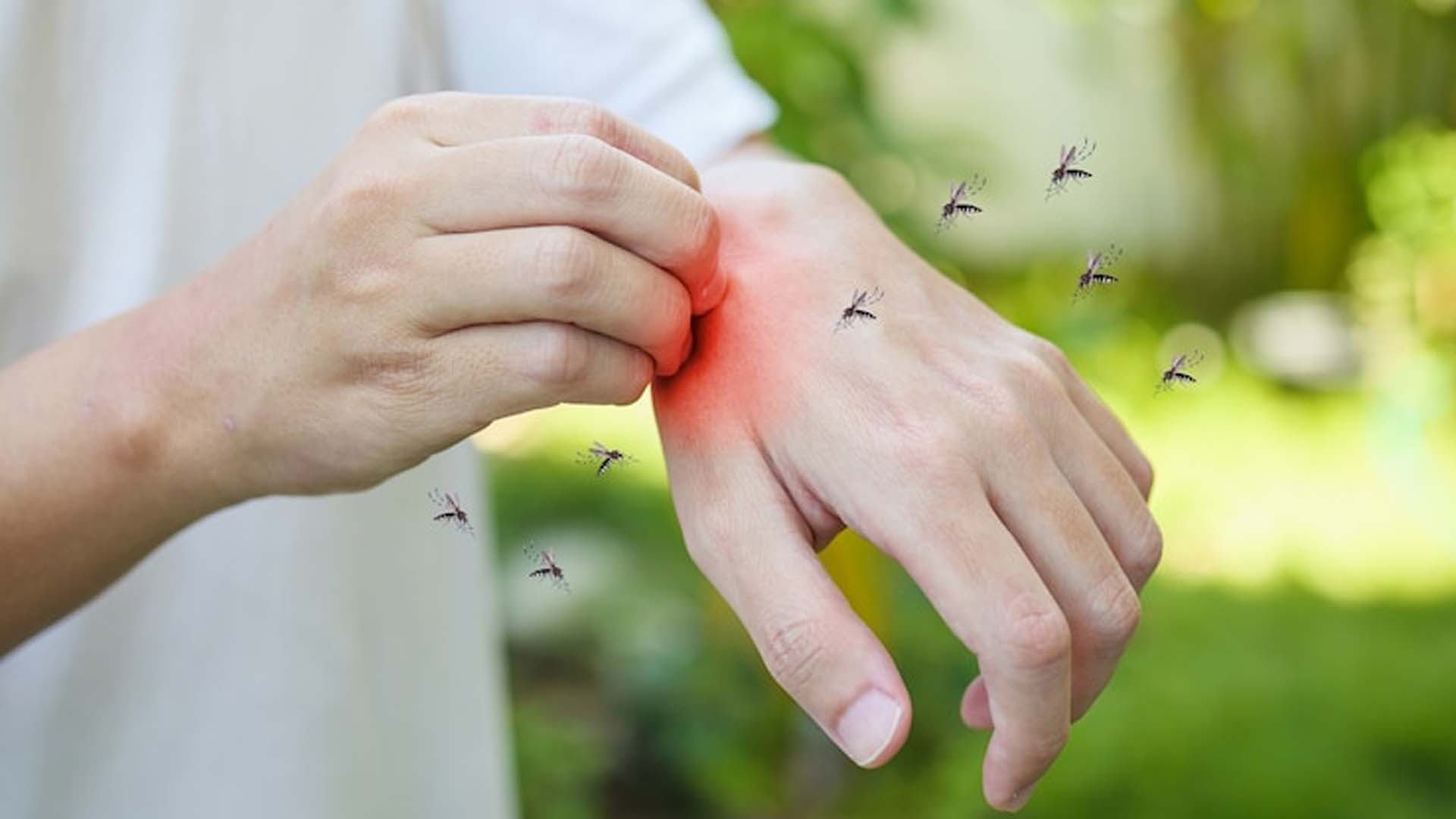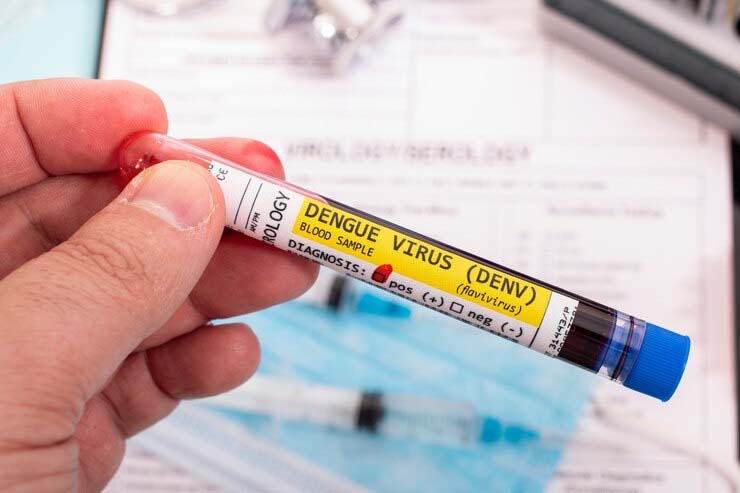Dengue: Types, Causes, Symptoms, Diagnosis, Treatment and Diet
September 7, 2022 | by Yashaswi Pathakamuri | Posted in Fever

Dengue is spread through mosquitoes that bite an infected person then transfer the virus to another person through a subsequent bite. Children between 5-9 years old are at the highest risk of contracting dengue fever. It is prevalent in tropical and subtropical regions of the world, including Southeast Asia and Latin America.
Dengue fever can be transmitted to people by mosquitoes. The virus spreads from person to person through bites from an infected female mosquito. Determining the type of dengue fever can help with treatment options for a patient. This is the most common type of dengue. This is when the virus can be found in the blood and through urine.
The World Health Organization (WHO) estimates that 50-100 million dengue infections occur annually. Dengue fever is a flu-like illness and is usually mild with symptoms lasting 2-7 days.
There are two types of this type of dengue: typical or secondary.
- Typical dengue is when a person has a fever with other symptoms such as headache, rash and pain.
- Secondary dengue is when a person has fever but no other symptoms like headache, rash and pain.
This article tells everything about Dengue Virus. It also tells about the causes, types, symptoms, diagnosis, treatment as well as diet and tips of dengue fever.
Causes and Types
Dengue fever is a mosquito-borne disease that is caused by any one of four closely related dengue viruses. It is transmitted by the Aedes aegypti mosquito, also known as the yellow fever mosquito.
There are four types of dengue virus: DEN-1, DEN-2, DEN-3, and DEN-4. The symptoms for each type are different. The first type of dengue is called
- DEN-1: It is a milder form of the virus that causes flu like symptoms and lasts for about five days.
- DEN-2: It causes a more severe form of the disease that can lead to hemorrhaging and shock.
- DEN-3: Which only affects children under the age of 15 years old and has milder symptoms than the other two types.
- DEN-4: This only affects people who have had previous exposure to dengue viruses in their lifetime or have had a recent dengue infection. It causes severe symptoms that can last for up to six weeks.
Symptoms
Dengue fever is a mosquito-borne tropical disease that causes flu-like symptoms. Dengue is spread by the bite of an infected female Aedes mosquito. The illness can lead to death if not treated quickly.
The most common symptoms are:
- High fever
- Pain in the joints
- Rash
Other symptoms may include:
- Headache
- Nausea
- Vomiting
- Diarrhea
- Abdominal pain
- Muscle pain
- Pain behind the eyes
There are four types of Dengue fever, which are classified according to their severity and symptoms:
- Dengue Fever: Milder form of dengue with fewer than 4 days of fever symptoms
- Dengue Hemorrhagic Fever (DHF): More severe form in which the patient experiences bleeding from many body orifices. “Dengue Hemorrhagic Fever” is a severe form of Dengue fever that often leads to death.
- Dengue Shock Syndrome (DSS): Still more severe form that includes low blood pressure and circulatory system failure.
- Dengue Death Syndrome (DDS): The most severe form that results in death due to circulatory system failure.
Risk Factors
Dengue is a mosquito borne disease that is caused by the dengue virus. It can be transmitted through the bite of an infected mosquito, where it infects the liver, lungs and other organs. The disease can also be transmitted from mother to child during pregnancy or childbirth.
The risk factors for dengue are:
- Being bitten by an infected mosquito
- Living near someone who has dengue
- Living in an area with a lot of mosquitoes
- Working outdoors in rural areas
- Having a weak immune system
Diagnosis and Tests
Dengue is a mosquito-borne viral infection. Dengue is diagnosed according to the symptoms and through tests. Symptoms typically appear between 4 and 10 days after exposure to the virus but can take as long as 14 days to appear.
The first signs of illness are often a sudden high fever with severe headache (sometimes accompanied by loss of appetite or nausea). This is followed in some cases by joint pains or other milder symptoms including rash and enlarged lymph nodes on one side of the neck (called “swollen glands”).
The tests for Dengue can be done by detecting the virus in the blood or by testing for antibodies against the virus. There are three types of tests to diagnose Dengue:

1) Virus detection test:
A virus detection test for Dengue fever is a blood test that can help determine if a person has the virus. The test detects the presence of antibodies to the virus, which means that the immune system has already fought off an infection.
This is not a diagnostic test to identify people who have Dengue fever, but it can help identify people who have been exposed to the virus and are at risk of developing symptoms in future.
2) Antibody test:
The antibody test for Dengue is a blood test which detects antibodies in the blood that are made by the body to fight against the virus. The test can confirm whether or not someone has had dengue in their lifetime.
There are two types of antibody tests available for dengue: an IgM antibody test and an IgG antibody test.
- IgM antibody test: It detects antibodies that have been produced by the body within a few weeks of getting infected with dengue virus.
- IgG antibody test: It detects antibodies that have been produced by the body over many years after getting infected with dengue virus.
3) Combined test:
The combined test for Dengue, which is also called the “Dengue Duo”, is a diagnostic tool that can be used to diagnose Dengue fever in patients. The test combines two different tests: The Rapid Diagnostic Test (RDT) and The Immunoglobulin M (IgM) Antibody Capture Enzyme-Linked Immunosorbent Assay (MAC-ELISA)
- The Rapid Diagnostic Test (RDT): It detects IgM antibodies, which are present in high levels during the first week of infection.
- MAC-ELISA: detects IgG antibodies, which are present at all stages of dengue infection. If both tests are positive, then it’s highly likely that the person has been infected with Dengue fever.
Prevention and Treatment
There are no specific medications for the treatment of Dengue. The most important thing is to avoid dehydration and maintain a healthy diet.
The best way to prevent Dengue is to avoid being bitten by mosquitoes. As the mosquito transmits the disease when it bites an infected person and then bites someone else, if you are bitten by a mosquito that has already fed on you than there is no need for it to feed again as they have their fill of your blood.
There are many ways you can do this:
- Stay indoors during peak mosquito hours (6 am-2 pm).
- Use insect repellent on skin and clothing when outdoors.
- Install or repair screens on windows and doors to keep mosquitoes out of your home.
- Use air conditioning when available or sleep under a mosquito net if not using air conditioning.
There are medicines to treat the symptoms of the disease. Despite the differences in severity, there are no known cures for Dengue. Patients are typically treated with medications like:
- Antipyretics
- Antibiotics
- Analgesics
Current research is focused on finding treatments that can prevent or reduce the severity of Dengue fever symptoms while waiting for a cure to be discovered.
Vaccines:
There is no vaccine for dengue fever.
The World Health Organization (WHO) is committed to reducing the global burden of dengue by 50% by 2020. This year, it has approved the world’s first vaccine for dengue fever.
The vaccine will be available in two forms: a live attenuated tetravalent Dengvaxia® vaccine and an inactivated monovalent Dengvaxia® vaccine.
- The tetravalent Dengvaxia® vaccine: This will be available only to individuals 9 years and younger who are at high risk for severe dengue disease severity.
- The inactivated monovalent Dengvaxia® vaccine: This will be recommended for use only among individuals aged 9 years and older.
Diet and Tips
The following diet and tips can help you manage your symptoms:
- The person should also avoid eating any cold food or drink, and should also not eat any food that can cause vomiting. This will help to reduce the risk of a relapse.
- If the person needs to eat, they should only consume warm food and drinks.
- Eat plenty of fruits and vegetables.
- Avoid foods with high salt content like crisps and salted nuts.
- Avoid foods with high fat content like fried foods and meat pies.
- Avoid sugary drinks such as soda, juice, or sports drinks. If you need a drink with sugar, choose something with less than 10 grams of sugar per serving such as iced tea or unsweetened fruit juice.
- Avoid eating any foods that contain high levels of sugar such as candy bars, ice cream, cookies, cakes, or pies. These foods can make your symptoms worse because they change the way your body responds to the virus.
- Limit your alcohol intake. Alcohol can trigger an increase in the severity of symptoms because it slows down your body’s ability to clear the virus.
- Stay hydrated by drinking plenty of water, or unsweetened tea or coffee without sugar.
Summary
Dengue fever is an infectious disease caused by one of four closely related dengue viruses. It is spread mainly by the bite of an infected Aedes mosquito. Dengue usually causes a sudden high fever, severe headache, pain behind the eyes, muscle and joint pain, and rash.
Most people recover from dengue fever within a week or two, but some can progress into the more severe and life-threatening form, dengue hemorrhagic fever, which may lead to death if not treated early.
If you have any of these symptoms and prolonged fever, you should speak to your doctor about your condition as soon as possible.
Recent Posts
Categories
- Arthritis
- B vitamins
- Berries
- Best time to take
- Breasfeeding
- cancer
- Chronic Diseases
- COVID-19
- Dairy
- Deficiency
- Diabetes
- Diet
- Diseases
- FAQ's
- Fats
- Fever
- Hair
- health
- Kidney
- Leafy Vegetables
- Lung disease
- mango
- Meat
- Millets
- Minerals
- Myositis
- Nausea
- Nutrition Facts
- Nuts and Seeds
- Oats and Oatmeal
- Psoriasis
- Recipes
- Rice
- Skin
- spices and Condiments
- Summer
- Thyroid
- Varicose Veins
- Vegetables
- Vitamins
- Vomiting
- water
- weight gain
- weight Loss
Archives
- April 2024
- March 2024
- February 2024
- January 2024
- December 2023
- November 2023
- October 2023
- September 2023
- August 2023
- July 2023
- June 2023
- May 2023
- April 2023
- March 2023
- February 2023
- January 2023
- November 2022
- October 2022
- September 2022
- August 2022
- July 2022
- June 2022
- May 2022
- April 2022
- March 2022
- February 2022
- January 2022
- December 2021
- November 2021
- October 2021
- September 2021
- July 2021
- June 2021
- May 2021
- April 2021
- March 2021
- February 2021
- January 2021
- December 2020
- November 2020
- October 2020
- September 2020
- August 2020
- July 2020
- June 2020
- May 2020
- April 2020
- March 2020
- February 2020
- January 2020